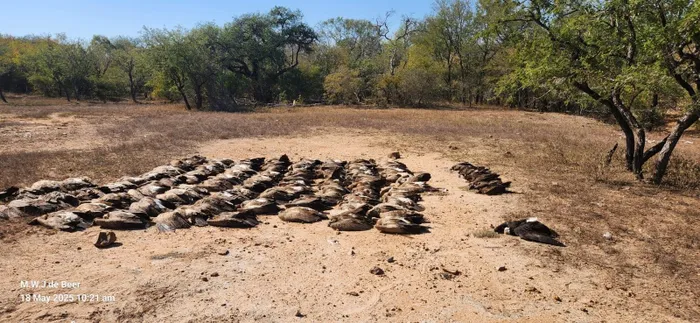
Wild and Free Wildlife Rehabilitation is a non-profit organisation located in Mpumalanga, South Africa, committed to nurturing cooperative relationships between humans and native wildlife. Established by Deidre Joubert, their mission focuses on mitigating human-wildlife conflicts through education, preventive strategies, and responsible conduct.
Image: Supplied
More than 100 vultures have died in another significant poisoning incident, this time in the Lionspruit Game Reserve near Marloth Park, Mpumalanga.
Africa's only vulture-focused conservation organisation, together with Wild and Free Rehabilitation Centre in Mpumalanga, confirmed the incident, saying 92 White-backed vultures of which 90% were breeding adults, nine hooded vultures and one male adult White-headed vulture, were killed.
The scene was located through real-time GPS tracking of several vultures previously rehabilitated and released by Vulpro and Wild and Free.
On detecting abnormal movement, Vulpro notified Wild and Free who then contacted the Nkomazi municipal field rangers.
Together, the team responded immediately to find a catastrophic scene with multiple carcasses lying around a warthog carcass. There were no survivors. Two more carcasses were discovered by air, thanks to SANParks who joined in on the search.
This deliberate act has caused irreparable damage to already declining vulture populations and underscores the growing and devastating impact of poisoning on South Africa’s critically endangered vulture populations, the organisations said.
Together with expert toxicologist and director of Griffon Poison Information Centre, Dr. Gerhard Verdoorn, and with the help of Dr Peet Venter, samples have been collected and will be submitted for toxicological testing to identify the poison used and supporting possible legal action.
“The scale of this poisoning is devastating and appears to be part of a much bigger, targeted operation. With multiple incidents taking place in various regions across the Lowveld recently, we suspect they are aimed at detracting us from a bigger and even more devastating event in the near future.
"We are calling on the government and the national vulture poisoning working group to address the crisis before it’s too late. To lose this number of vultures, let alone adult breeding birds during breeding season is an ecological crisis. We are genuinely terrified of what next is going to occur,” said Vulpro CEO Kerri Wolter.
In response to this incident and the growing frequency of poisoning cases, Vulpro is appealing to all rehab centres in the Lowveld to stop releasing vultures in the area until such threats are fully investigated and mitigated.
Just days ago, Vulpro formalised a long-standing partnership with Wild and Free Wildlife Rehabilitation Centre, based in Hectorspruit. Together, the two organisations have established a vulture emergency response unit in Mpumalanga, delivering rapid on-site field response to poisoning and injury cases, expert veterinary care at Wild and Free’s on-site clinic and long-term rehabilitation and monitored releases through Vulpro’s national programme.
With support from conservation groups, WeWild Africa and Over and Above Africa, this initiative links veterinary expertise, field operations, and conservation strategy across provincial boundaries, unified in the mission to stop vulture extinction.
“This is not just about one event. It’s about a systemic threat to our natural balance. We are fighting for every egg, every nest, and every vulture’s future. Through science, integrity, and collaboration, we will hold the line,” said Wolter.
Earlier this month, more than 100 vultures died in a mass poisoning at the Kruger National Park.
The incident in the Mahlangeni Section of the Park was detected by the Endangered Wildlife Trust’s (EWT) wildlife poisoning surveillance and detection system which triggered an alert, flagging suspicious activity in a remote section of the park.
Within hours, a joint SANParks and EWT team mobilised, arriving on site. There, they discovered the grim reality: a mass poisoning event involving hundreds of vultures. This was the result of an elephant carcass laced with highly toxic agrochemical pesticides - poison laid by poachers to harvest body parts for the illegal wildlife trade.
Cape Times
Related Topics: